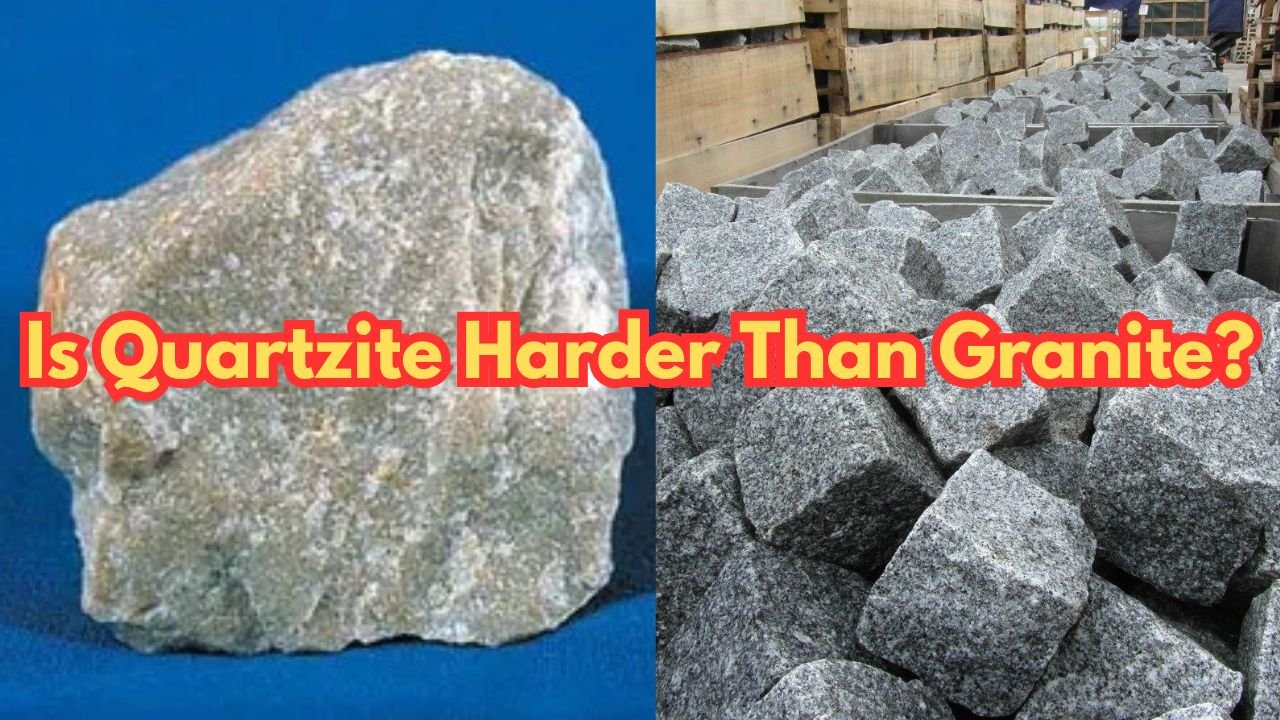Is Quartzite Harder Than Granite? Yes, quartzite is harder than granite. Quartzite has a Mohs hardness of 7, while granite ranges from 6 to 6.5.
When choosing a natural stone for your countertops, flooring, or other surfaces, durability is a major factor. Two of the most popular options—quartzite and granite—offer incredible strength and beauty.
But if you’re wondering which one is harder, more scratch-resistant, and better suited to your needs, this guide will help you make an informed decision.
In this article, you’ll explore the hardness differences between quartzite and granite, their pros and cons, how they compare in durability, maintenance, and aesthetics, and find answers to common questions about these materials.
Contents
- 1 Understanding Hardness in Natural Stones
- 2 Quartzite vs. Granite: Which One is Harder?
- 3 Key Differences Between Quartzite and Granite
- 4 Pros and Cons of Quartzite and Granite
- 5 Maintenance and Care
- 6 Which One Should You Choose?
- 7 Frequently Asked Questions (FAQs)
- 8 Conclusion: Is Quartzite Harder Than Granite?
Understanding Hardness in Natural Stones
When selecting natural stone for surfaces like countertops, flooring, or wall cladding, hardness is a key factor in determining durability and longevity. Harder stones are more resistant to scratches, abrasions, and everyday wear and tear, making them ideal for high-traffic areas in homes and commercial spaces.
One of the most reliable ways to measure a stone’s hardness is by using the Mohs Hardness Scale, which ranks minerals based on their ability to resist scratching. [Is Quartzite Harder Than Granite?]
What is the Mohs Hardness Scale?
Developed in 1812 by German geologist Friedrich Mohs, the Mohs Hardness Scale is a comparative scale used to measure a material’s resistance to scratching. It ranks minerals on a scale of 1 (softest) to 10 (hardest). The principle behind this test is simple: a harder material can scratch a softer one. [Is Quartzite Harder Than Granite?]
Here are some examples of minerals ranked on the Mohs scale:
- Talc – 1 (Very soft, easily scratched by a fingernail)
- Gypsum – 2 (Slightly harder but still soft, found in plaster)
- Calcite – 3 (Common in limestone and marble, can be scratched by a copper coin)
- Fluorite – 4 (Used in some gemstones, can be scratched by a knife)
- Apatite – 5 (Found in tooth enamel, can be scratched by steel)
- Feldspar – 6 (A common mineral in granite, resistant to minor scratches)
- Quartz – 7 (A primary component of quartzite, highly scratch-resistant)
- Topaz – 8 (Very durable, used in jewelry)
- Corundum (Sapphire, Ruby) – 9 (Extremely tough, used in industrial cutting tools)
- Diamond – 10 (Hardest known natural material, used in cutting and drilling tools)
How Does the Mohs Scale Apply to Natural Stones?
Most natural stones used for countertops and flooring fall within the Mohs hardness range of 3 to 7, with some exceptions. [Is Quartzite Harder Than Granite?]
- Quartzite (Mohs 7): Highly scratch-resistant due to its high quartz content. It is one of the hardest natural stones available for residential and commercial applications.
- Granite (Mohs 6-6.5): Harder than many stones but slightly softer than quartzite. It can withstand scratches but is more susceptible to minor abrasions over time.
- Marble (Mohs 3-4): Considerably softer than quartzite and granite, making it prone to scratches and etching, especially in kitchens and bathrooms.
- Limestone (Mohs 3-4): Similar to marble, it requires frequent maintenance and sealing to protect against scratches and stains.
- Soapstone (Mohs 1-2): One of the softest natural stones, known for its smooth, matte texture but easily scratched.
Why Hardness Matters in Choosing Natural Stone
When selecting a stone for countertops, flooring, or other surfaces, hardness is crucial because it determines: [Is Quartzite Harder Than Granite?]
- Scratch Resistance – Harder stones like quartzite and granite are less likely to develop scratches from knives, cookware, or heavy objects.
- Durability – A stone’s ability to withstand wear and tear is often linked to its hardness. Harder stones maintain their finish longer and require less maintenance.
- Longevity – Stones with higher hardness last longer in high-traffic areas such as kitchens, entryways, and commercial spaces.
- Ease of Maintenance – Softer stones like marble and limestone require more frequent sealing and care, whereas harder stones like quartzite need less upkeep.
Limitations of the Mohs Scale
While the Mohs scale is an excellent tool for comparing minerals, it has some limitations: [Is Quartzite Harder Than Granite?]
- It only measures scratch resistance, not impact resistance. A stone with a high Mohs rating can still chip or crack if struck with force.
- It does not account for chemical resistance. Some hard stones, like quartzite, may still etch when exposed to acidic substances.
- Variability within a single stone type. Some granite varieties may be softer or harder depending on their mineral composition.
Quartzite vs. Granite: Which One is Harder?
Quartzite’s Hardness Level
Quartzite is one of the hardest natural stones, scoring 7 on the Mohs scale. Since it is mainly composed of quartz, it is extremely resistant to scratches, wear, and tear. This makes it a great option for high-traffic areas like kitchen countertops and flooring.
Granite’s Hardness Level
Granite is also a very hard and durable stone, but it ranks slightly lower on the Mohs scale, typically between 6 and 6.5. While it is still resistant to most scratches, it is more prone to minor abrasions over time compared to quartzite. [Is Quartzite Harder Than Granite?]
What Does This Mean for You?
If you need a surface that is highly scratch-resistant and can withstand heavy daily use, quartzite is the superior choice in terms of hardness. However, granite remains a strong and reliable option that offers plenty of durability for most homeowners.
Key Differences Between Quartzite and Granite
1. Composition and Formation
- Quartzite: Formed from sandstone that undergoes intense heat and pressure, transforming it into a dense, hard rock.
- Granite: An igneous rock composed of quartz, feldspar, and mica, giving it a speckled, grainy appearance.
2. Porosity and Stain Resistance
Both stones are porous, meaning they can absorb liquids and stain if not sealed properly. [Is Quartzite Harder Than Granite?]
- Quartzite is less porous than granite, making it slightly more resistant to stains.
- Granite requires regular sealing to prevent staining from liquids like wine, coffee, or oil.
3. Heat and Chemical Resistance
- Both stones are heat-resistant, allowing you to place hot pots and pans directly on the surface.
- Quartzite is more sensitive to acidic substances (like lemon juice and vinegar), which can cause etching over time.
- Granite is more resistant to acids, making it a better option for kitchens where acidic ingredients are frequently used.
4. Aesthetic Differences
- Quartzite: Has marble-like veining and soft color variations, giving it a high-end, luxurious appearance.
- Granite: Features a speckled, grainy pattern and comes in a wider variety of colors.
Pros and Cons of Quartzite and Granite
✅ Advantages of Quartzite
✔ Extremely hard and scratch-resistant
✔ Resembles marble with elegant veining
✔ More stain-resistant than granite
❌ Disadvantages of Quartzite
✖ Requires sealing to prevent stains
✖ More expensive than granite
✖ Difficult to cut and install due to its hardness
✅ Advantages of Granite
✔ Durable and widely available
✔ More affordable than quartzite
✔ Lower maintenance with regular sealing
❌ Disadvantages of Granite
✖ Slightly softer than quartzite, making it more prone to scratches
✖ More porous, requiring frequent sealing
✖ Limited in marble-like veining options
Maintenance and Care
Quartzite Maintenance Tips
- Seal it regularly to prevent stains and moisture absorption.
- Clean with a pH-neutral cleaner to avoid etching from acidic substances.
- Use cutting boards to avoid potential damage from sharp knives.
- Wipe up spills immediately, especially acidic liquids like lemon juice, vinegar, and wine.
Granite Maintenance Tips
- Seal it at least once a year to protect against stains and moisture.
- Use mild soap and water for daily cleaning.
- Avoid harsh chemicals that could dull the surface over time.
- Place trivets under hot pans, even though granite is heat-resistant.
See more: Is Nioh Harder Than Ninja Gaiden?
Which One Should You Choose?
Your choice between quartzite and granite depends on your specific needs, budget, and aesthetic preference. [Is Quartzite Harder Than Granite?]
- Choose quartzite if:
✅ You want a harder, scratch-resistant surface
✅ You love the look of marble but need more durability
✅ You don’t mind paying a higher price for long-term performance - Choose granite if:
✅ You want a cost-effective, durable option
✅ You prefer a speckled, classic appearance
✅ You don’t mind regular sealing and maintenance
Both are excellent choices, but quartzite is the harder and more durable option for long-term use. [Is Quartzite Harder Than Granite?]
Frequently Asked Questions (FAQs)
Is quartzite more expensive than granite?
Yes, quartzite is generally more expensive than granite due to its hardness and the difficulty of cutting and installing it. However, prices vary based on color, rarity, and location. [Is Quartzite Harder Than Granite?]
Does quartzite scratch easily?
No, quartzite is highly scratch-resistant due to its hardness. It is harder than granite and can withstand heavy daily use without scratching easily. [Is Quartzite Harder Than Granite?]
Do quartzite and granite require sealing?
Yes, both stones require sealing to prevent stains and moisture absorption. Quartzite is less porous than granite but still benefits from sealing. [Is Quartzite Harder Than Granite?]
Can I place hot pots directly on quartzite or granite?
Yes, both quartzite and granite are heat-resistant, meaning you can place hot pots on them without damage. However, using trivets is always a good practice to extend the lifespan of your countertops.
Which stone is better for outdoor use?
Granite is a better choice for outdoor use because it is more resistant to weathering and UV exposure. Quartzite can also be used outdoors, but it may fade or degrade over time with prolonged sun exposure. [Is Quartzite Harder Than Granite?]
Conclusion: Is Quartzite Harder Than Granite?
Quartzite is harder than granite, making it more scratch-resistant and durable. However, granite remains a strong and cost-effective choice for many homeowners. Your final decision should be based on your budget, maintenance preferences, and aesthetic taste.
No matter which one you choose, both quartzite and granite will add beauty and longevity to your home! [Is Quartzite Harder Than Granite?]

Octavia Rowland is a blogger and writer who loves exploring new ideas. She studied sociology and works as a social worker. In her free time, she enjoys spending time with her parents.

